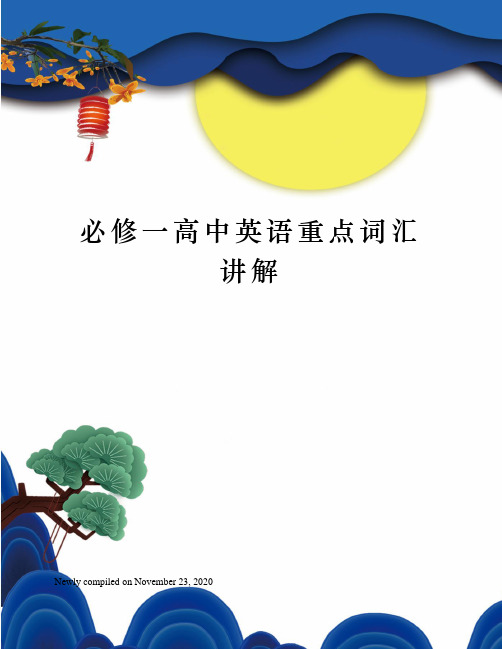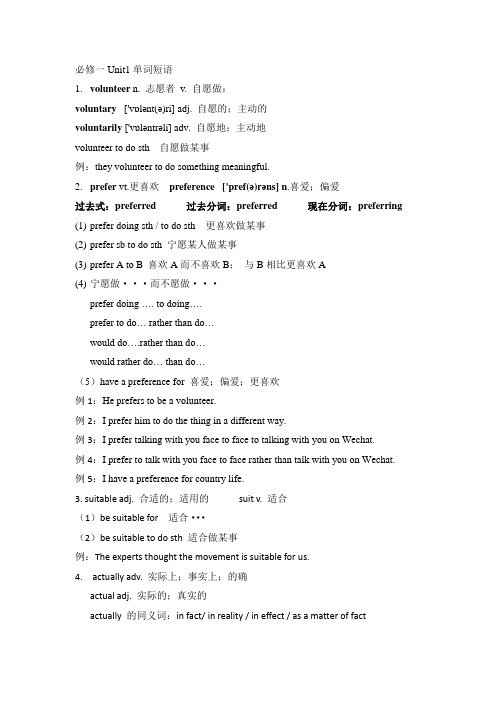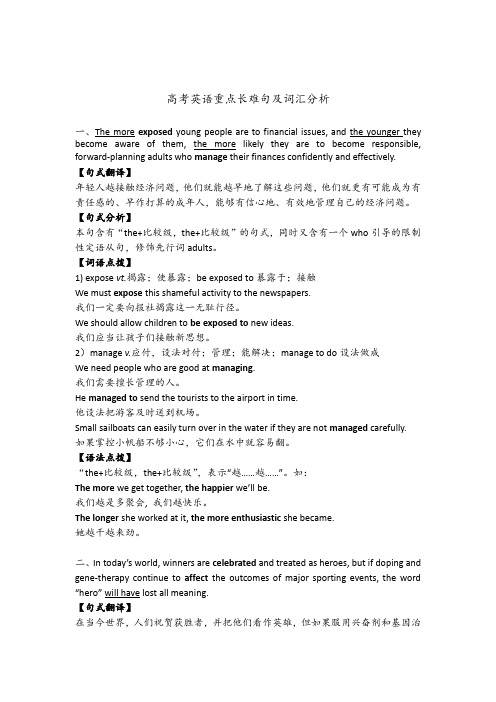重点英语词汇的讲解分析
2024最新版英语3500高频词汇讲解(讲义17)

高考3500高频词汇讲解171. point v./n.一、变形:points二、词义:1)看法e.g. We disagree with every point she makes.我们不同意她提出的任何观点。
2)重点e.g. The point is you shouldn't have to wait so long to see a doctor.关键是看病不该等那么长时间。
3)意图;目的e.g. I don't see the point of doing it all again.我就不明白,再做一次有什么意义。
v.1)(用手指头或物体)指,指向e.g. He pointed to the spot where the house used to stand.他指出那所房子原来所在的地方。
e.g. She pointed her finger in my direction.她指着我这个方向。
2)瞄准~ sth (at sb/sth)e.g. He pointed the gun at her head.他举枪对准了她的头。
3)对着;朝向+ adv./prep.e.g. The telescope was pointing in the wrong direction.望远镜对错了方向。
e.g. The signpost pointed straight ahead.路标直指前方。
三、常用词组1)from the point of view 从…角度来看e.g. Do you think that, from the point of view of results, this exercise was worththe cost?从效果来看,你认为这种锻炼值得花这笔钱吗?2)point out指出; 指明e.g. I should point out that these estimates cover just the hospital expenditures.我应该指出,这些估价只包括医院的开支。
必修一高中英语重点词汇讲解

必修一高中英语重点词汇讲解Newly compiled on November 23, 2020Unit 1 Friendship一:重点词的讲解up把......加起来Please add up the scores and we'll see who won.把你们的得分加起来,我们就可以看出谁赢了。
Add的用法(1)增加;增添Add up to 加起来等于;总计;结果是Add A to B/add A to B 把A和B加起来Add to 增加;增添Please add some salt to this dish.往这道菜里搁点盐。
(2)补充说;继续说;其后常跟that从句或是和直接引语连用He added that they return soon.他补充说他很快就回来。
I have nothing to add to my statement.我对我的陈述没有什么可补充的。
(1)adj. 心烦意乱的;不愉快的;肠胃不适Be upset about/over sth. 为某事烦心。
Be upset that... 心烦There is no point getting upset about it.犯不着为此事烦心。
(2)使不安It upsets sb. that 让某人心烦的是It upsets sb. to do sth. 做某事让某人不快It upsets me to think of her all alone in that big house.想到她孤身一人守着那所大房子,我就感到不舒服Vt. 忽视;对...不理睬;不顾He had completely ignored her remark, preferring his own theory. 他完全不理睬她的评论,认为自己说的更有道理。
Ignorant adj. 不知的;无知的Ignorance n. 无知;愚昧Be ignorant of/about sth. 对某事不了解Be in ignorance of sth. 不知某事;对某事不了解V.使平静;使镇静;安静The excited girl quickly calmed down.那个激动的女孩很快的平静了下来。
英语重点词汇how come用法详解

英语重点词汇how come用法详解1.why 是最常见的,万能的问原因,什么时候都可以用,但其他两个不可以! (用于问句)为什么,为何;(反问,表示不必)何必;(说明理由)为什么,…的原因一般结构:why+一般疑问句语序2.how come 是口语用法,不在书面语中出现;为什么,怎么会……一般结构:how come+陈述句语序?.what for就更加简单易懂3.what for?是一个完整的提问了,后面什么不接,直接表示为什么,对上一句提问(或者对当时出现的场景提问)…怎样;为何;处罚;为什么下面还是用例句来进行解析;1)Why were you late?你为什么迟到?Tell me why you did it.告诉我你为什么这样做。
‘I would like you to go.’‘ Why me? ’“我希望你去。
”“为什么要我去呢?”Why oh why do people keep leaving the door open? 人们到底为什么总敞着门呢?Why get upset just because you got one bad grade? 何必因为一次成绩不好就想不开呢?Why bother to write? We'll see him tomorrow.还费事写信干什么?我们明天就见到他了。
Why hasn't he brought the whisky?他为什么没把威士忌拿来?《柯林斯高阶英汉双解学习词典》Why don't you look where you're going?走路怎么不看着点儿道呢?《柯林斯高阶英汉双解学习词典》Why didn't he stop me?为什么他没阻止我?《柯林斯高阶英汉双解学习词典》Why can't I remember the exact year we married?为什么我记不起我们结婚的准确年份了?Why don't you come home with me until you sort things out? 你何不先和我一起回家,等事情解决了再走?2)'How come we never know what's going on?' he groused “为什么我们对正在发生的事情总是一无所知?”他抱怨说。
英语重点词汇good考点解析详解

英语重点词汇good考点解析详解1、be good at 意为“擅长bai……”,表示“du擅长于某一学科知识zhi或技能”,也可表示“在……方面做dao得好。
后接名词、代词或V-ing形式。
例:I'm good at drawing。
我擅长绘画。
He is good at maths.他擅长数学.2、be good for意为“对……有好处、能”。
例:Running is good for your health. 跑步对你身体有好处。
Eating more vegetables is good for your health. 多吃蔬菜对你的健康有好处。
Exercise is good for health.运动有益于健康。
3、be good with意为“灵巧的;与……相处得好”。
例:She is good with her hands. 她手很巧。
He is very good with the children. 他与这些孩子处得很好。
4、be good to意为“对……友好”。
to后一般接表示人的代词或名词,其中good可用friendly代替。
例:Miss Li is very good/friendly to us student. 老师对我们学生非常好。
My friend was good to me when I was ill. 我生病时我的朋友对我关怀备至。
5、Be good! 好好的!别淘气!听话,用于口语交流中。
例:I'll be good, I swear! 我会听话的,我发誓!名词 n.1.利益;好处,用处[U]What good will it do you?这会给你带来什么好处呢?2.善;好事;慷慨的行为[U]There is good in her, in spite of her bad reputation.尽管她名声不佳,她还是有善的一面.3.长处,优点[U]4.(总称)好人[the S][K]Christians believe the good will go to heaven when they die. 基督教徒相信好人死了进天堂.定语从句的功能相当于一个形容词,对先行词起修饰、限制的作用;同位语从句的作用相当于一个名词,说明前面的名词的具体内容。
(完整word版)研究生英语考研英语重点词汇辨析及解析

同义词、混淆词辨析1.assess,estimate, appraise, evaluate对客体的重要性形成定论,评估,估算,评价【辨析】estimate [ˈestimeit]暗示评价的主观性和不精确appraise [əˈpreɪz] 表示专业水准的评估,名词appraisalassess [əˈses]表示为确定某物的应税价值而做出的权威估价evaluate [iˈvæljueit]表示在确定价值时经过了深思熟虑,不一定是金钱价值2. assume, suppose假定, 设想,担任; 承担; 接受【辨析】suppose [səˈpəuz]最不正式,表示根据一定证据做出的见解,assume [əˈsju:m] 用于逻辑推理,强调一种缺乏证据的结论,以检验某种建议。
3. consistent, persistent【辨析】consistent [kənˈsistənt]表明持之以恒,表明一种好的意志品质persistent [pəˈsistənt]也有坚持的含义,但有时表明顽固不化。
4.create,compose, invent, design, produce, manufacture创造, 创作, 引起, 造成【辨析】create [kriˈeit]指“ 创造出原来不存在或与众不同的事物”, compose [kəmˈpəuz]指“ 创作(诗、画、音乐或文章等)”com是在一起,manufacture [ˌmænjuˈfæktʃə]强调大规模制造5.evident, apparently.明显, 显著, 明白, 迹象【辨析】evident [ˈevidənt]指明显的有根据,所以表达作者的赞成apparently [əˈpærəntlɪ] 指看起来的明显,但事实并非如此,经常是假象。
6.factors,element, ingredient.因素,要素,因数【辨析】factor [ˈfæktə] 具有数学及解析意味,是一个整体的成分;element [ˈelimənt] 强调这一部分是基础性的,不可或缺的,如元素;ingredient [inˈɡri:djənt]只是表明构成一种混合物的成分。
新外研高中英语必修三unit3 核心重点词汇讲解

Unit 3 核心重点词汇讲解1. press v. 压,按,熨平,催促n. 报刊,新闻界;新闻工作者pressure n.压力,压强pressed adj.时间紧迫/缺钱等press sb to do/into doing sth 催促某人做某事press sth on sb勉强某人接受be hard-pressed to do sth 很难做某事press the button 按按钮the press 新闻界(后面谓语一般用复数)press conference 新闻发布会the Oxford University Press 牛津大学出版社put sb under pressure 使...处于压力之下reduce/relieve/release pressure 减轻/释放压力2.shoot -shot-shot 射击;拍摄;发芽;投篮,射门,飞驰n. 嫩芽,新枝;拍摄,打猎shoot past 飞驰而过shoot up 快速长高,猛涨shoot a basket 投篮shoot a movie 拍电影bamboo shoots 竹笋have shot your bolt 竭尽全力;倾其所有be like shooting fish in a barrel易如反掌;探囊取物shoot yourself in the foot 搬起石头砸自己的脚Eg.1)She shot an angry glance at him.她很生气,瞪了他一眼.2)He shot from the middle of the field and still managed to score. 他在中场投篮,仍成功命中。
shot n. 照片;镜头;射球;尝试,注射have a flu shot 打流感预防针give it a shot 试一下screenshot 屏幕截图3.powder n. 粉末v. 搽粉To face the powder,not to powder the face.4. Living without an aim is like sailing without a compass.生活没有目标就像航海没有指南针。
高一英语必修一unit1重点词汇短语讲解

必修一Unit1单词短语1.volunteer n. 志愿者v. 自愿做:voluntary ['vɒlənt(ə)ri] adj. 自愿的;主动的voluntarily ['vɒləntrəli] adv. 自愿地;主动地volunteer to do sth 自愿做某事例:they volunteer to do something meaningful.2.prefer vt.更喜欢preference ['pref(ə)rəns] n.喜爱;偏爱过去式:preferred 过去分词:preferred 现在分词:preferring(1)prefer doing sth / to do sth 更喜欢做某事(2)prefer sb to do sth 宁愿某人做某事(3)prefer A to B 喜欢A而不喜欢B;与B相比更喜欢A(4)宁愿做···而不愿做···pre fer doing …. to doing….p refer to do… rather than do…w ould do….rather than do…w ould rather do… than do…(5)have a preference for 喜爱;偏爱;更喜欢例1:He prefers to be a volunteer.例2:I prefer him to do the thing in a different way.例3:I prefer talking with you face to face to talking with you on Wechat.例4:I prefer to talk with you face to face rather than talk with you on Wechat. 例5:I have a preference for country life.3. suitable adj. 合适的;适用的suit v. 适合(1)be suitable for 适合···(2)be suitable to do sth 适合做某事例:The experts thought the movement is suitable for us.4. actually adv. 实际上;事实上;的确actual adj. 实际的;真实的actually 的同义词:in fact/ in reality / in effect / as a matter of fact5. challenge n. 挑战;艰巨任务v. 怀疑;向···挑战challenger n. 挑战者challenging adj. 有挑战性的face a /the challenge 面对挑战meet a/the challenge 迎接挑战accept a/the challenge 接受挑战challenge sb. to sth. 向某人挑战某事6. fluent adj. 流利的;熟练的fluently adv. 流利地fluency n. 流利;流畅be fluent in 在···方面流利7. graduate v. 毕业;获得学位n. 毕业生graduation n. 毕业;毕业典礼(1) graduate from… 毕业于···(学校)(2) graduate in… 毕业于···(专业)例1:He graduated from Beijing Normal University.例2:He graduated in English.8. recommend vt. 建议;推荐;介绍(1)recommend doing sth. 建议做某事(2)recommend sb to do sth 建议某人做某事有类似用法的还有:allow, permit, forbid, advise(3)r ecommend that… 建议···(从句中的谓语动词应用“should +动词原形”,其中should 可以省略)(4)recommend sth to sb (recommend sb sth)把某物推荐给某人(5)r ecommend sb as… 推荐某人担任···例1:He recommended reading the book before seeing the movie.例2: The doctor recommended his patient to go out for a walk.例3: The teacher recommended that everyone (should) take an active part in the English party.例4:I recommend the book to all my students.例5:I recommend her as your secretary.9.advanced adj. 高级的;高等的;先进的advance n./v. 前进;发展in advance = ahead of time= ahead of schedule 提前;预先10. quit v. 停止;戒掉;离开(工作职位、学校等)(1) quit doing sth 停止做某事(2) quit as… 辞去···(职务)例: He has decided to quit as manager of the team.11. responsible adj. 负责的;有责任的responsibility n. 责任;义务(1)be responsible for 对···负责(2)take responsibility for 对··负责(3)take on responsibilities 承担责任(4)a sense of responsibility 责任感(5) It is a responsibility to do sth 做某事是一种责任12. obviously adv. (常用于句首)显然;明显地obvious adj. 明显的;显而易见的I t is obvious/clear that… 很明显;很显然It seems obvious/clear that… 很明显;很显然13. schedule n. 工作计划;日程安排vt. 安排;为···安排时间;预定(1) on schedule =on time 按时;准时;按预定时间(2) ahead of schedule =ahead of time = in advance提前; 早于预定时间(3) behind schedule 晚于预定时间(4) as scheduled 如期;按照预定时间(5) be scheduled for + (时间)被安排在···(时间);定于···;预定····(6) be scheduled to do sth 被安排做某事;预定/预计做某事例1:You’d better finish the project on schedule.例2:The party is scheduled for the weekend.例3:The film star is scheduled to arrive in Shanghai at ten o’clock.14.editor n. 主编;编辑edit v. 编辑15.adventure n. 冒险;奇遇adventurous adj. 爱冒险的;喜欢冒险的16.survival n. 生存;幸存survive v. 幸存;生存survivor n. 幸存者17.expert n. 专家adj. 熟练的;内行的be expert at/in 擅长;精通;在···方面是内行例:She is expert at making cheap but stylish clothes.18.behaviour n. 行为;举止behave v. 行为;举止;表现(1)behave oneself守规矩;有礼貌;举止规矩(2)behave well 表现得好;举止得体(3)behave badly 表现得不好;举止不文明;没有礼貌19.attract vt. 吸引;引起···的注意(兴趣)attraction n. 吸引;吸引力;具有吸引力的人或事物attractive adj. 迷人的;有吸引力的···(1)be attracted to 喜爱(2)be attracted by 被···所吸引(3)attract... to...把···吸引到···(4)attract one’s attention 引起某人的注意。
(完整)高考英语重点长难句及词汇分析

高考英语重点长难句及词汇分析一、The more exposed young people are to financial issues, and the younger they become aware of them, the more likely they are to become responsible, forward-planning adults who manage their finances confidently and effectively.【句式翻译】年轻人越接触经济问题,他们就能越早地了解这些问题,他们就更有可能成为有责任感的、早作打算的成年人,能够有信心地、有效地管理自己的经济问题。
【句式分析】本句含有“the+比较级,the+比较级”的句式,同时又含有一个who引导的限制性定语从句,修饰先行词adults。
【词语点拨】1) expose vt.揭露;使暴露;be exposed to暴露于;接触We must expose this shameful activity to the newspapers.我们一定要向报社揭露这一无耻行径。
We should allow children to be exposed to new ideas.我们应当让孩子们接触新思想。
2)manage v.应付,设法对付;管理;能解决;manage to do设法做成We need people who are good at managing.我们需要擅长管理的人。
He managed to send the tourists to the airport in time.他设法把游客及时送到机场。
Small sailboats can easily turn over in the water if they are not managed carefully.如果掌控小帆船不够小心,它们在水中就容易翻。
- 1、下载文档前请自行甄别文档内容的完整性,平台不提供额外的编辑、内容补充、找答案等附加服务。
- 2、"仅部分预览"的文档,不可在线预览部分如存在完整性等问题,可反馈申请退款(可完整预览的文档不适用该条件!)。
- 3、如文档侵犯您的权益,请联系客服反馈,我们会尽快为您处理(人工客服工作时间:9:00-18:30)。
重点英语词汇的讲解分析词都是由一个或几个语素构成的。
构成语素分两种,一种叫词根,指的是意义实在、在合成词内位置不固定的不成词语素和成词语素。
以下是与英语相关的重点词汇分解,欢迎大家阅读!重点英语词汇的讲解分析1. seem/ look(1) seem一般着重于以客观迹象为依据,意思是“似乎、好象、看起来…”。
The baby seems to be happy.婴儿看上去似乎很高兴。
He seemed to be sorry for that.他似乎为那件事感到抱歉。
seem能与to do结构连用,而look不能。
It seems to rain. 似乎要下雨了。
They seemed to have finished their work.他们似乎已经完成了工作。
在it作形式主语的句型中只能用seem。
It seems that he is quite busy now.他现在看起来很忙。
It seems to us that there is nothing serious.在我看来没什么大不了的。
(2) look用作“看起来;好像”时,常从物体的外观或样貌上来判断,是以视觉所接受的印象为依据的。
The room looks clean.这间房看起来很干净。
The girl looks like her mother.那女孩看起来向她的妈妈。
2. such/ soDon’t be such a fool.别这么傻。
He is such a clever boy.他是如此聪明的一个男孩。
(2) so是副词,用来修饰形容词或副词。
He is so kind! 他真好心!Why did you come so late? 你为何回来得如此晚?当名词前有many, much, few, little等表示多、少时,应该用so。
He has so many friends.他有如此多的朋友。
Only so little time is left! 才剩这么一点儿时间!3. either/ too/ also(1)either用作“也”时是副词,常用于否定句句尾。
She is not a Japanese, I’m not, either.她不是日本人,我也不是。
My sister doesn’t like this song, either.我妹妹也不喜欢这首歌。
(2)too常用于肯定句或疑问句尾,表示“也”。
He likes China, too.他也喜欢中国。
Are you in Grade 3, too? 你也在三年级吗?(3)also也常用于肯定句或疑问句,但一般位于句中。
We are also students.我们也是学生。
He also went there on foot.他也是走着去的。
Did you also want to have a look? 你也想看看吗?4. if/ whether在下列情况下只能用whether而非if:(1)与or not连用时,只能用whether.We want to know whether you are ill or not. 我们想知道你是否生病了。
Please tell me whether or not you havefinished your work.请告诉我们你是否完成了工作。
(2)后接动词不定式时,只能用whether.Adam didn’t know whether to go or stay.亚当不知道是走还是留。
He hasn’t decided whether to have dinner with me.他还没决定是否和我共进晚餐。
(3)所引导的宾语从句放在主句之前时,只能用whether.Whether it will rain or snow, we don’t mind. 我们不在乎将要刮风还是下雨。
Whether I won or lost, she didn’t want to know.我是赢是输她不想知道。
(4)引导主语从句或表语从句时,一般用whether.The most important was whether they had gone.最重要的是他们是不是已经走了。
Whether he will go with me is a secret.他是否会和我一起去还是个秘密。
if能引导条件状语从句,表示“如果,假如”,而whether没有此用法。
We’ll have a football match if it doesn’train tomorrow.如果明天不下雨,我们要进行足球赛。
I’ll tell him if I sees him.我看见他就告诉他。
If you’re in danger, please call 110.如果你遇到危险,请拨打110。
5. cost/ spend/ pay/ take(1) cost一般用某物来做主语,表示“(某物)值…、花费…”,既能指花费时间也能指金钱。
The new bike costs me 300 yuan.这辆新自行车花了我三百元。
It will cost you a whole to read through this book.通读这本书将会花费你整整一周时间。
cost 还可以用作名词,表示“成本、费用、价格、代价”等。
What’s the cost of this TV set? 这台电视机的成本是多少钱?They succeeded at the cost of hard work.他们辛苦地工作换来的成功。
(2) spend一般用某人来作主语,表示“(某人)花费…,付出…”,也能指时间或金钱,指时间时常与in搭配,指金钱时常与on或for搭配。
We spent two days in repairing this machine.我们花了两天时间修理这台机器。
Mr. Lee spends $20 on books every month.李先生每月花二十美元在书上。
(3) pay用作动词时,一般也以某人作主语,但一般指花钱、付款等,很少用来指花费时间。
常与for搭配使用。
They paid 70 yuan for the tickets.他们花了七十元买票。
He was too poor to pay for his schooling.他穷得交不起学费。
pay还可以用作名词,意思为“薪水、工资”等。
It’s hard for me to live with such low pay.我很难靠这么低的薪水生活下去。
(4)take也指“花费(时间、金钱)”,但通常用某事、某物做主语,或用形式主语it.How long will the meeting take? 会议要开多久?It took me several hours to get there. 我花了几个小时才到那儿。
6. bad/ badly这两个词的意思含有“坏、糟、严重”等意思,且它们有共同的比较级worse和最高级worst 。
(1) bad是一个形容词,意思是“坏的,糟糕的,差的,严重的”。
I don’t think he is a bad person.我并不认为他是一个坏人。
I had a bad headache.我的头疼得很厉害。
(2)badly是一个副词,意思是“不好地,差”,也可以表示程度,意为“严重地,非常,极度”。
We need help badly.我们急需帮助。
His arm was badly hurt.他的胳膊严重受伤了。
7. interested/ interesting(1) interested是指“对…产生兴趣的,对…感兴趣的”,一般用人做主语,后常用介词in.He was interested in biology before.他以前对生物感兴趣。
I’m not interested in art.我对艺术不感兴趣。
(2)interesting的意思是“有趣的”,指能够给人带来兴趣的某人或某事物。
He is an interesting old man.他是个有趣的老头。
The interesting story attracted me. 这个有趣的故事吸引了我。
8. dead/ die/ death/ dying(1) dead是形容词,意思为“死了的、无生命的”,表示状态,可以与一段时间连用。
The tree has been dead for ten years.这棵树死了有十年了。
The rabbits are all dead. 这些兔子都是死的。
(2) die是动词,意思为“死、死亡”,是一个瞬间动词,不能与一段时间连用。
My grandpa died two years ago.我爷爷两年前去世了。
The old man died of cancer.老人死于癌症。
(3) death是名词,意思为“死亡、去世”等。
The memorial hall was built one year after his death.他死后一年,纪念馆建成了。
His death is a great loss to us.他的死是我们的巨大损失。
(4) dying 是die的现在分词,用作形容词,意思是“垂死的、即将死去的”。
The doctors have saved the dying man.医生们救活了那个垂死的人。
The poor dog had no food, it was dying.可怜的狗没有食物,快要饿死了。
;我。
